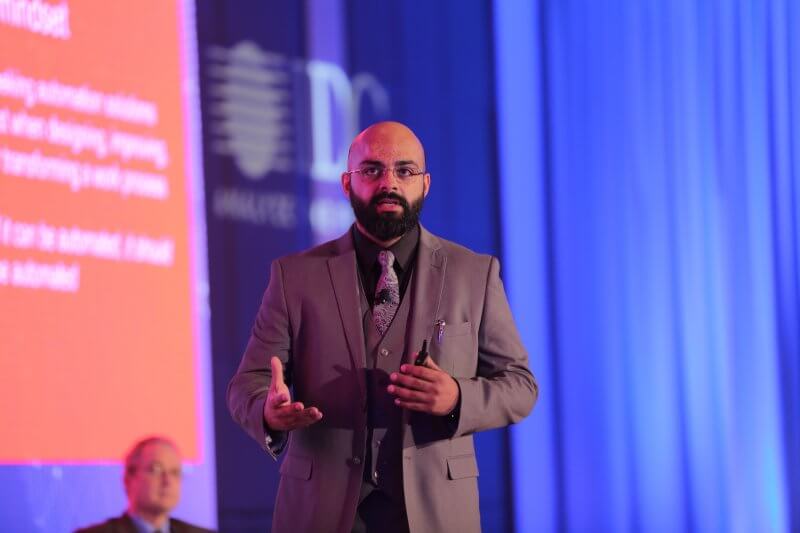Deputy Editor Giorgia Guantario talked with Karan Dixit, VP – MEA, at UiPath, to understand how the RPA leader has been supporting organisations during the COVID-19 pandemic.
The rapid spread of COVID-19 has disrupted industries all over the world, with organisations having to frantically adapt to remote working and the challenges that come with this new working style.
Facing such disruption, organisations have turned to technology to meet a new set of requirements imposed by the pandemic. Major among them is Robotic Process Automation (RPA), a technology that allows for quick automation of manual tasks and creation of digital assistants.
The current situation is proof that organisations need to accelerate digital transformation in order to stay afloat, and RPA is the technology that could help them achieve this goal and answer their growing digital demands.
Karan Dixit, VP – MEA, at UiPath, the global leader in RPA, told CNME how UiPath’s team has been responding to the emergency and how RPA has been helping different industries cope with the challenges they’re facing and accelerating their digital transformation journey.

Karan, who joined UiPath in 2018, believes that the main issue organisations are facing due to the pandemic has to do with capacity – many industries, including insurance, retail, and banking, have in fact had to deal with an increasing number of customers requests.
“Just because planes are not flying, or stores are not open, it doesn’t mean that the airline or retail industries have stopped their operations. Organisations have had to deal with an increasing number of back and front-office administration processes to meet the demands of their customers,” continued Karan.
“RPA as a technology allows organisations to scale up those processes and provide digital capacity at a moment’s notice. The ease of use and extremely fast deployment of UiPath’s RPA technology is helping businesses across all industries to quickly and efficiently cope with these new requirements.”
In fact, the very nature of RPA, which is to transform the way people work and operate, has put this technology in the perfect position to help organisations that are trying to adapt to remote working and to accelerate digital transformation.
Karan continued, “The level of disruption we have seen due to this pandemic is something that industries were not prepared for and could not expect. At UiPath, we are used to working in a disruptive environment because that’s one of the characteristics of our technology – RPA is fundamentally changing the way people work.
“In the past few weeks, we have actually seen an increasing demand from our customers and partners, and our team is very focused to help any industry overcome this new challenge. We’ve always believed RPA could make a big difference for businesses, but we are now seeing a true validation of the technology from the global marketplace. The engagement has been incredible and it’s the best motivation we could ask for in these difficult times.”
Specifically, UiPath has been playing a key role in helping the healthcare industry deal with the huge influx of patients and data, which has massively increased due to COVID-19.
At the end of March, the RPA leader launched a pro bono automation project with the Mater Misericordiae University Hospital in Dublin, Ireland. The initiative assigns software robots to the Infection Prevention and Control (IPC) Department in order to reduce the administrative strain placed upon the department by multidrug-resistant organisms or viruses such as COVID-19, enabling IPC nurses to spend more time with patients.
Karan was however keen to explain that the healthcare industry has many facets, and UiPath has been helping with each and every one of them.
He said, ”The healthcare industry spreads across different aspects – while frontline medical staff has been under a lot of strain, there has also been an increase in capacity for testing and appointments, as well as on the insurance and government side in order to deal with claims, or the medical supply chain. RPA is essentially trying to ‘flatten the curve’ across all these divisions by providing the capacity necessary to deal with the greater influx generated by this pandemic.”
Karan also explained that social distancing and the necessary closure of physical offices and stores created the perfect environment to encourage learning and upskilling within organisations.
He said, “A lot of customers who cannot continue certain projects because they’d require office presence have been engaging with us to train their teams on RPA. It’s important for them to upskill and rethink about how they work in order to bring immediate business value to the organisation once this emergency is over – UiPath has been helping customers achieve this by offering our first-of-its-kind, online RPA training and certification curriculum for free.”
Uipath’s Academy program, which has seen over 550,000 enrolled individuals since its launch in 2017, has recently been extended to include new learning paths, functionalities and certifications.
The company has also launched a “Reboot Your Skills Program,” a four-week learning sprint for professionals that want to develop in-demand RPA skills.
Karan continued, “At UiPath, we are committed to training workers in RPA across all the innovative functionalities we are offering across our portfolio. In today’s time of emergency, these same functionalities and technologies have become the most relevant and valuable to deal with processes and keep businesses going.”
Karan concluded by expressing UiPath’s desire to help organisations and partners face this emergency with RPA technology.
“UiPath is very keen on helping during this difficult time by leveraging our technologies and knowledge. Our vast partner ecosystem has also demonstrated an eagerness to help and we’ve been able to reach many organisations thanks to their help. Moreover, as more and more use cases come up, such as the one with Mater Misericordiae University Hospital in Ireland, we would like to share these experiences in order to spark new ideas that could help others during this pandemic.”





